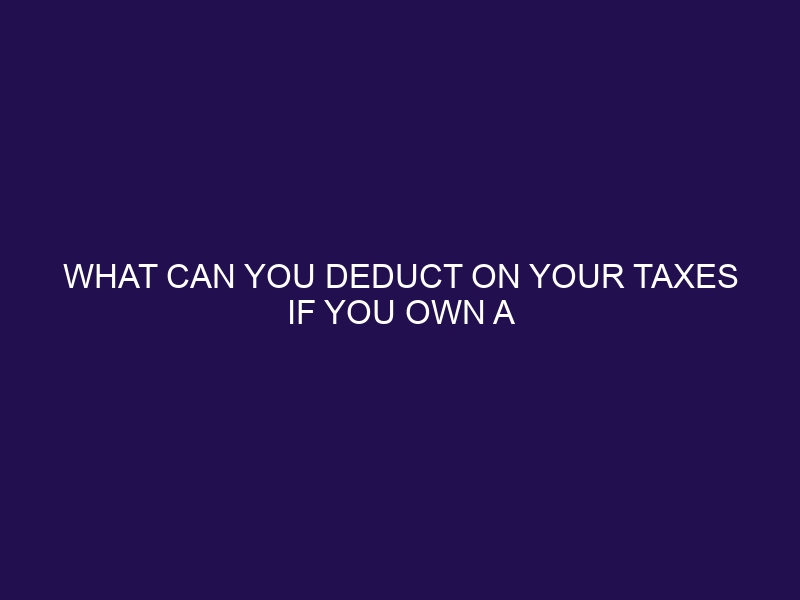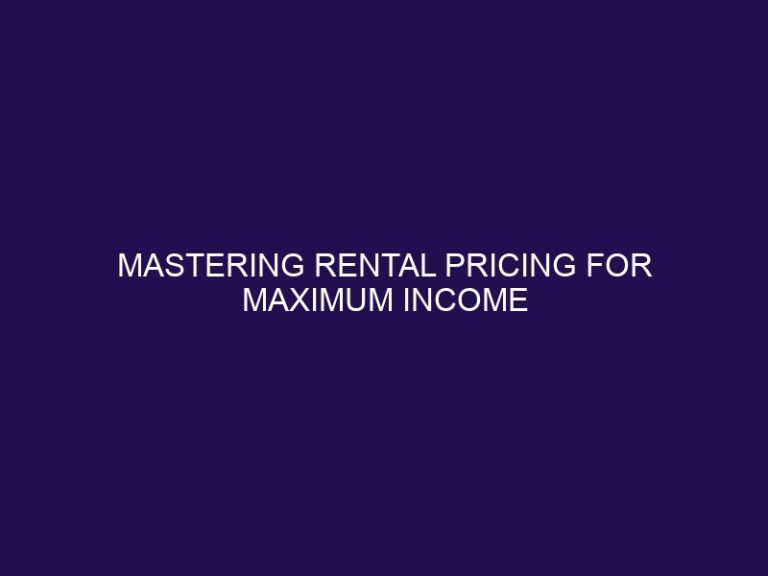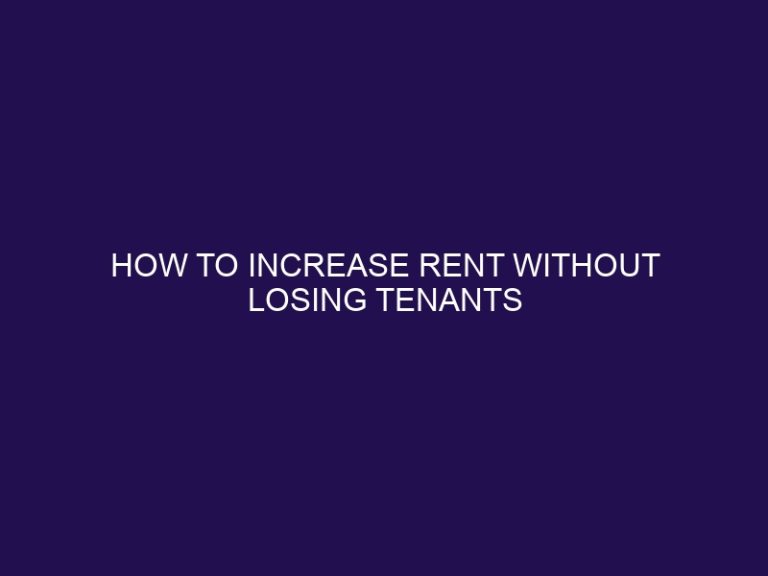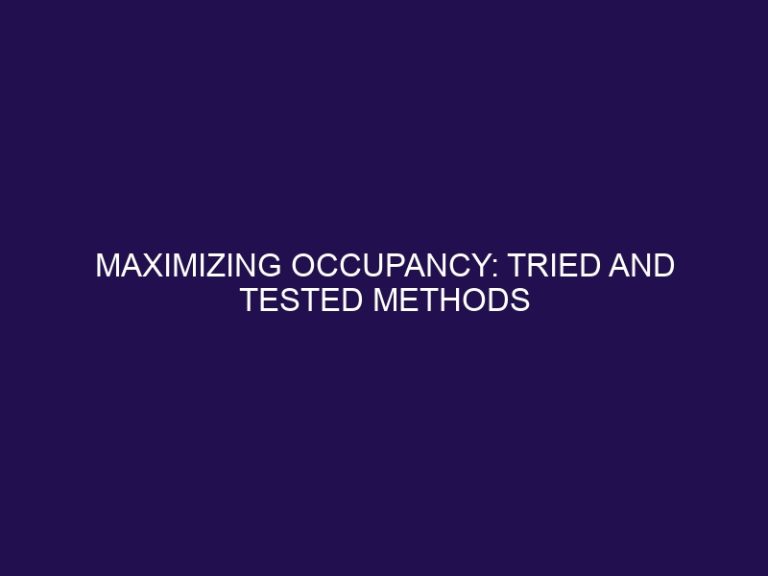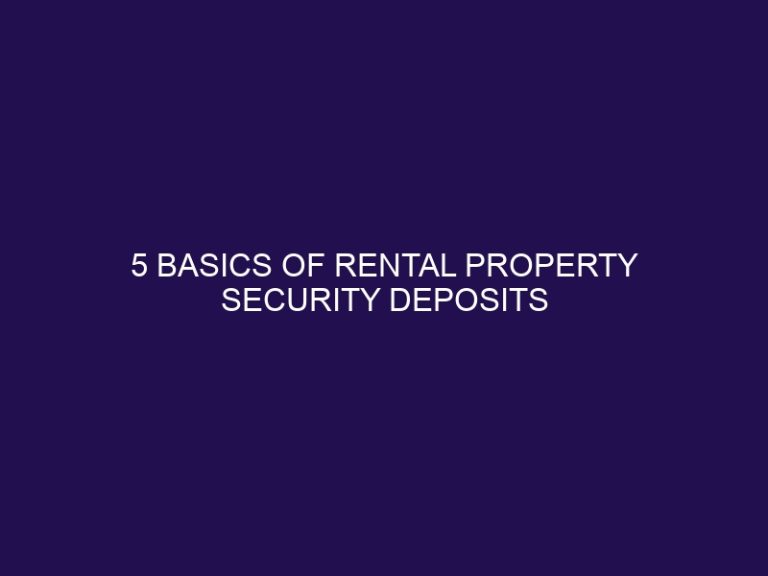What Can You Deduct on Your Taxes if You Own a Rental Property?
Introduction to Rental Property Taxes
Owning a rental property can be a lucrative investment, but it also comes with certain tax implications. As a landlord, you are required to report your rental income and expenses on your tax return. However, you may also be able to deduct certain expenses related to your rental property, which can help reduce your overall tax liability. In this article, we will explore what can and cannot be deducted on your taxes if you own a rental property.
What is a Rental Property?
A rental property is a real estate investment that generates income by leasing out to tenants. This can include various types of properties such as single-family homes, apartments, condos, or commercial properties.
What is Considered a Rental Property?
Any property that is owned and used for the purpose of producing rental income is considered a rental property. This can also include renting out a portion of your primary residence, such as a spare bedroom.
What is Not Considered a Rental Property?
A property that is not used for the purpose of generating rental income is not considered a rental property. For example, a vacation home that is only used by the owner and not rented out to others would not be considered a rental property for tax purposes.
What Can You Deduct on Your Taxes for a Rental Property?
As a landlord, you are entitled to deduct certain expenses related to your rental property to reduce your taxable rental income. These deductions can include:
- Mortgage Interest – You can deduct the interest portion of your mortgage payments on your rental property.
- Property Taxes – Property taxes paid on your rental property can also be deducted.
- Insurance – The premiums you pay for insurance coverage on your rental property are deductible.
- Depreciation – You can deduct a portion of the cost of your rental property over several years as it depreciates in value.
- Repairs and Maintenance – Any repairs and maintenance expenses for your rental property are deductible.
- Utilities – You can deduct the cost of utilities, such as electricity and water, if you pay for them as the landlord.
- Home Office Expenses – If you have a dedicated space in your home that is used exclusively for managing your rental property, you can deduct home office expenses.
- Travel Expenses – If you travel for the purpose of managing your rental property, such as to visit tenants or make repairs, you can deduct these expenses.
- Legal and Professional Fees – Fees paid to attorneys, accountants, or property managers for managing your rental property are deductible.
- Advertising and Marketing – Any expenses related to advertising and marketing your rental property can be deducted.
What Can’t You Deduct on Your Taxes for a Rental Property?
While there are many expenses that can be deducted on your taxes for a rental property, there are also some that cannot be deducted. These include:
- Personal Expenses – You cannot deduct any expenses that are not directly related to your rental property, such as your personal vehicle expenses or groceries.
- Improvements – Expenses that improve the value of your rental property, such as adding a new deck or renovating the kitchen, cannot be deducted. These costs are considered capital expenses and must be depreciated over time.
- Vacancy Costs – If your rental property is vacant and not generating income, you cannot deduct any expenses during that period.
- Landscaping and Lawn Care – The cost of maintaining the exterior of your rental property, such as lawn care or landscaping, cannot be deducted.
- Capital Expenses – Expenses that are considered improvements, such as replacing the roof or installing a new HVAC system, are not deductible.
How to Keep Track of Your Rental Property Expenses for Tax Purposes?
It is important to keep accurate records of all expenses related to your rental property to properly report them on your tax return. This can include keeping receipts, invoices, and other documentation. It may also be helpful to use accounting software or a spreadsheet to track these expenses throughout the year. This will make
Key Takeaways:
What is a Rental Property?
A rental property is a type of real estate that is leased or rented out to tenants. This can include houses, apartments, or commercial spaces. A friend of mine bought a house, rented it out, and used the income to pay off the mortgage, ultimately creating a portfolio of rental properties.
What is Considered a Rental Property?
A rental property is any property leased or rented to tenants for residential or commercial use. This includes houses, apartments, condominiums, and commercial buildings. For tax purposes, it is important to understand what is considered a rental property in order to accurately report and deduct expenses.
What is Not Considered a Rental Property?
Property that is not rented for profit, personal residences, vacation homes, or properties used by family or friends without payment are not considered rental properties.
What Can You Deduct on Your Taxes for a Rental Property?
As a rental property owner, you may be wondering what expenses you can deduct on your taxes. In this section, we will discuss the various deductions that are available to you. From mortgage interest and property taxes to home office expenses and advertising costs, we’ll cover all the potential deductions that can help reduce your tax liability. By understanding the tax benefits of owning a rental property, you can maximize your savings and make the most of your investment.
1. Mortgage Interest
- Learn about the eligibility criteria for the mortgage interest deduction.
- Obtain Form 1098 from your lender to report the interest paid.
- List the deductions on Schedule A of Form 1040.
Did you know? The mortgage interest for rental properties can also be deducted on your tax return, resulting in a lower taxable income.
2. Property Taxes
- Understand Assessment: Learn how 2. property taxes are assessed, taking into account the property’s value and local tax rates.
- Research Exemptions: Explore potential exemptions or deductions related to property taxes for rental properties.
- Consult Tax Professional: Seek advice from a tax professional for specific implications of property taxes.
Fun Fact: Property taxes can fund various public services, such as education and infrastructure.
3. Insurance
- Gain a thorough understanding of the insurance coverage necessary for rental properties.
- Compare various insurance options for rental properties to determine the most suitable policy.
- Make sure that the insurance policy meets all legal and financial requirements.
- Consistently review and update the insurance coverage to match the evolving needs of the property.
4. Depreciation
Depreciation is a valuable tool that allows you to deduct the cost of the property over a period of time. For example, residential rental properties can be depreciated over 27.5 years, while commercial properties can be depreciated over 39 years. It is important to carefully track depreciation as it can have a significant impact on tax liabilities.
5. Repairs and Maintenance
- Regular Inspection: Conduct routine checks for any wear and tear.
- Immediate Repairs: Address any damages promptly to prevent further deterioration.
- Maintain Records: Keep detailed records of all repairs and maintenance activities and expenses for tax purposes.
Did you know? Deducting qualified rental property expenses can lower your taxable income.
6. Utilities
- Track Usage: Monitor and document all utility expenses related to the rental property.
- Separate Bills: Keep utility bills separate from personal usage for accurate deductions.
- Record-keeping: Maintain meticulous records of utility payments and usage.
In 1882, Thomas Edison’s Pearl Street Station in New York City became the world’s first central power plant, revolutionizing utilities and urban development.
7. Home Office Expenses
- Designate a specific area in your home for your home office.
- Keep detailed records of all expenses related to your home office, including receipts and bills for tax purposes.
- Calculate the percentage of your home used for business purposes in order to accurately deduct home office expenses.
- Document all relevant receipts and bills for tax purposes to ensure proper deductions.
A friend of mine, a freelance writer, diligently maintains a home office for her writing assignments. She meticulously records all expenses related to her office, ensuring accurate tax deductions.
8. Travel Expenses
- Keep thorough records of all travel expenses related to your rental property, including transportation, accommodation, and meals.
- Separate personal and rental property travel expenses to accurately calculate deductible costs.
- Document the purpose of each trip and its relevance to the management or maintenance of the rental property.
9. Legal and Professional Fees
When managing legal and professional fees associated with your rental property, it is important to maintain thorough records. These fees may include expenses for lawyers during eviction proceedings, property management services, and accounting fees for tax preparation and financial statements.
10. Advertising and Marketing
- Identify Target Audience: Determine the demographic and psychographic characteristics of potential renters.
- Strategic Channels: Utilize various platforms, including social media, rental websites, and local publications, for advertising and marketing.
- Engaging Content: Create enticing listings, virtual tours, and visually appealing images to attract potential renters.
- Monitor Results: Keep track of inquiries, property viewings, and conversion rates to effectively optimize advertising and marketing strategies.
What Can’t You Deduct on Your Taxes for a Rental Property?
As a rental property owner, you may be familiar with the tax deductions you can claim for your property. However, it is equally important to understand the expenses that are not eligible for deductions. In this section, we will discuss the various costs that cannot be deducted on your taxes for a rental property, including personal expenses, improvements, vacancy costs, landscaping and lawn care expenses, and capital expenses. Knowing what cannot be deducted will help you accurately file your taxes and avoid any potential issues with the IRS.
1. Personal Expenses
- Maintain separate accounts for personal expenses and rental expenses.
- Do not mix personal expenses with rental property expenses.
- Keep meticulous records to differentiate between personal expenses and rental property expenses.
2. Improvements
- Focus on structural changes, such as adding a new room or renovating the kitchen, to increase the value of your property.
- Document all improvements with receipts and invoices for tax claims.
- Consult IRS guidelines to ensure eligibility for deductions.
Keep records organized and seek professional advice for complex cases.
3. Vacancy Costs
Vacancy costs, including lost rental income during periods of property vacancies, cannot be claimed as tax deductions. However, expenses related to the process of renting out the property, such as advertising and agent fees, are eligible for deduction. It is important to maintain thorough records to substantiate these deductions.
4. Landscaping and Lawn Care
- Regularly mow the lawn to maintain its appearance and health.
- Enhance the property’s curb appeal by trimming bushes, trees, and hedges.
- Create a neat and polished look by edging the lawn.
- Uphold the landscape’s aesthetics by removing weeds and unwanted plants.
A friend diligently maintained their rental property’s garden, resulting in increased tenant satisfaction and property value.
5. Capital Expenses
- Maintain detailed records of all capital expenses, including purchase dates, costs, and descriptions of any improvements made.
- Categorize each expense accurately to differentiate them from deductible repairs.
- It is advisable to seek guidance from a tax professional to ensure compliance with IRS regulations.
Did you know? Capital expenses can have a significant impact on the depreciation and tax deductions for your rental property.
How to Keep Track of Your Rental Property Expenses for Tax Purposes?
- Maintain meticulous records of all rental property expenses throughout the year.
- Utilize accounting software or apps to track and categorize expenses accurately.
- Retain receipts, invoices, and bank statements as evidence for tax deductions.
Pro-tip: Consider consulting a tax professional to ensure all expenses are correctly documented and eligible for tax deductions.
Frequently Asked Questions
What can you deduct on your taxes if you own a rental property?
As a rental property owner, you can deduct various expenses related to owning and managing the property. This includes mortgage interest, depreciation, property taxes, repairs and maintenance costs, travel expenses, insurance premiums, and home office expenses. It is important to keep detailed records and seek help from a qualified tax professional to ensure all deductions are properly claimed.
What is the tax treatment of income and losses for rental property owners?
The tax treatment of income and losses for rental property owners depends on their classification as a passive investor or a real estate professional. Passive investors can deduct losses up to a certain limit, while real estate professionals can deduct losses without limitation. It is important to understand the difference and how it affects your tax return.
What are some specific costs that can be deducted for vacation rentals?
Vacation rentals are treated similarly to long-term rentals for tax purposes. This means that you can deduct mortgage interest, depreciation, property taxes, repairs and maintenance costs, travel expenses, insurance premiums, and home office expenses. However, there may be additional expenses specific to vacation rentals, such as license fees and marketing expenses, that may also be deductible.
Can personal tax be deducted for rental properties?
No, personal tax cannot be deducted for rental properties. However, personal tax can potentially be reduced through deductions for rental property expenses. It is important to keep personal and rental expenses separate and to have proper documentation for all deductions claimed.
What are the tax implications for short-term rentals?
Short-term rentals, such as Airbnb rentals, are treated the same as long-term rentals for tax purposes. This means that all the same deductions for long-term rentals are applicable to short-term rentals. However, there may be additional tax implications for short-term rentals, such as sales and local taxes, and it is important to stay up-to-date with tax laws and regulations.
How can hiring a qualified tax professional benefit rental property owners?
Hiring a qualified tax professional can benefit rental property owners in many ways. They can help ensure all deductions are properly claimed, provide personalized recommendations for tax planning, and keep you informed about any changes in tax laws. They can also help with timely alerts and reminders for important tax filing deadlines. This can ultimately help maximize tax savings and avoid any potential issues with the IRS.

